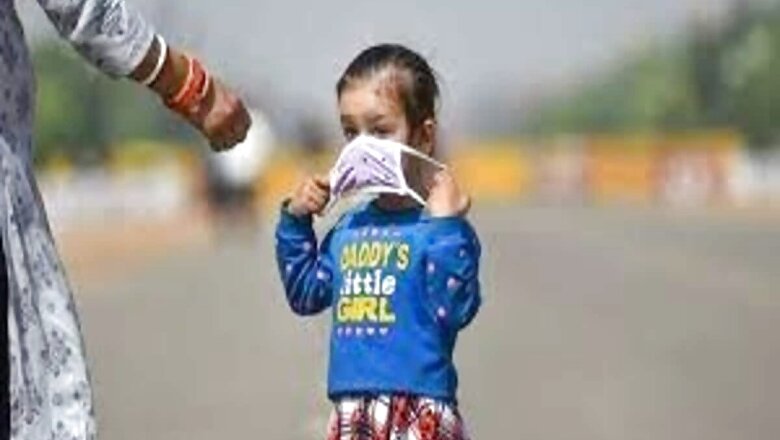
views
Until kids become eligible for vaccination, how can we protect them?
We are awaiting the results of clinical trials being conducted on children. These have been fast-tracked and the results and recommendations are expected shortly. In the meantime, adults in the family have a greater responsibility of protecting the children from COVID-19 as they (adults) may be the carrier of infection for the kids. Second, kids above 2 years of age can wear a mask and avoid playing in groups. Children should eat a nutritious diet to keep up their immunity.
Are there any early symptoms for COVID that parents should take note of? When should they raise an alarm?
Most children will show symptoms like mild fever, cough, coryza, vomiting, loose motions, irritability, throat pain, body ache and tiredness. These are the usual symptoms of any seasonal flu and are best treated symptomatically with paracetamol and other simple remedies, under the guidance of regular family physician or paediatrician. We are recommending parents maintain a simple symptom chart at home that could be shared with your doctor; I personally recommend you take time off from work for a day or two and supervise the child at home.
If there is any deterioration in the child’s condition, it needs to be picked up as soon as possible. Prolonged and high-grade fever, breathing difficulties, poor feeding, vomiting, loose motions, dehydration, severe abdominal pain, headache, and most importantly, any significant and prolonged change in the child’s behaviour and demeanour, red and swollen eyes and lips, and rashes on the body should raise an alarm. These need urgent consultation with the paediatrician.
What is black fungus and can kids get it too?
Black fungus or mucormycosis is a rare fungal infection. Fungi cannot infect a healthy person with normal immunity and usually infects only those who have a weak immune system. Hence, they are called opportunist microorganisms. These are extremely rare in children with COVID as compared with adults. Adults with COVID are more likely to have an immune-compromised status due to co-morbidities like diabetes as well as the sometimes indiscriminate use of steroids. We need to be careful in monitoring children in the ICU to prevent any such occurrence, if at all.
Since the virus can spread through air, should children not be allowed to step out of the house?
The new guidelines tell us that droplets can spread infection for up to 10 metres, so it is preferable not to allow children to go play in common play grounds. Stepping out of home must be avoided. Wearing a mask is mandatory. Children aged 2 and above should wear masks in public settings as well as when around people who don’t live in their house. A mask, however, is not a substitute for social distancing. Masks should be worn in addition to staying at least 6 feet apart, especially when indoors around people who don’t live in the same household. It is important to demonstrate to children the correct way of wearing masks—masks should completely cover the nose and mouth and fit snugly against the sides of the face without gaps. Children should wear a mask inside the house if someone they live with is sick with symptoms of COVID-19 or has tested positive for COVID-19. They should be trained to wash their hands with soap and water for at least 20 seconds or use a hand sanitizer with at least 60 per cent alcohol after touching or removing their mask.
When will a vaccine for children be available? Will they also have to take two doses?
Vaccines for adolescents above 12 years of age are expected to be available by September 2021; thereafter, it will take another six to eight months to get vaccines for children below 12 years of age. They will need to take two doses. Trials are underway for a nasal vaccine, which promises to additionally impart local immunity in the respiratory track, thus stopping the virus at its very point of entry into the human body.
There is talk about the third wave affecting children the most. Why is that?
There is no evidence as yet to say with certainty that the COVID-19 virus has acquired any greater affinity or pathology for children. The first wave affected senior citizens in particular and the second wave adults; many in these cohorts have developed immunity. These segments have had the benefit of vaccination as well. This leaves out the as yet, largely uninfected below-18 population, which is relatively more vulnerable. As this segment constitutes about 40 per cent of the total population of the country, if there is a third wave, it is likely to spread among children.
If a child has already got infected and recovered, how long will the immunity last?
Immunity after COVID infection is expected to last six months to even decades and the exact duration of protection is still not known.
What kind of foods can help boost the child’s immunity?
Balanced, nutritious, protein-rich diet with iron, multivitamins and other micronutrients can help boost immunity. Good sleep and a balanced lifestyle with physical activity and play are all expected to play a role in boosting immunity.
How can parents ensure children stay fit and active while being at home?
Children must eat well, exercise regularly and stay positive. It is best to follow a schedule. The schedule should include the child’s daily personal chores as well as household chores appropriate to their age. Helping parents with household chores should be fun—simple day-to-day activities like cooking, watering the plants, playing with siblings and so on. Make the child feel appreciated for contributing at home, in howsoever small way. Keep little ‘fun corners’ for kids in your home—where they can paint, play puzzle, read a book or even dance. Incorporate ‘clean up time’ in a fun way so that things don’t get too cluttered. The family can together clean the house with some music to go along.
Taking all the regular vaccines as per the national schedule is important as they vaccines prevent children from catching infections. This will reduce the burden of illnesses, especially during the approaching monsoons. Of course, none of them can prevent COVID infection.
Read all the Latest News, Breaking News and Coronavirus News here. Follow us on Facebook, Twitter and Telegram.














Comments
0 comment